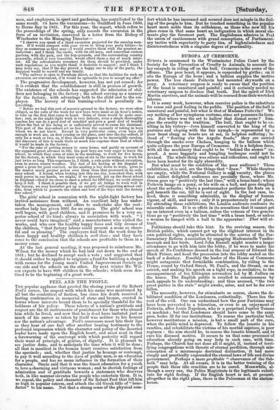PEEL AND THE PEOPLE.
Tan popular applause that greeted the closing years of Sir Robert Peel's career, the respect with which his name was mentioned by all but the condottieri of faction, has since his death received a lasting confirmation in memorial of stone and bronze erected in towns whose interests bound them to be specially thankful for the boldness of his policy. These tokens of a nation's gratitude and respect are the fit instruments of punishment for those who abused him while he lived, and now that he is dead have imitated just so much of his career as taken by itself was neither to -his honour nor the nation's advantage. Peel's successors must bite their lips as they hear of one fact after another bearing testimony to the profound impression which the character and policy of the deserted• leader have made upon the English heart, and must read in that a forewarning of the contempt with which posterity will regard their want of principle, of genius, of dignity. It is pleasant to see justice done, and to anticipate the time when it will be done ; all that is manliest in the human heart receives satisfaction from the spectacle • and, whether that justice be homage or contempt, to pay it well according to the dues of public men, is an education for a people, and has no mean influence in the formation of their character. Steele said that it was the finest education for a youth to love a charming and virtuous woman ; and to cherish feelings of admiration and of gratitude towards a statesman who deserves both, in like manner elevates the people who entertain them. It is, we repeat, the policy and character of Sir Robert Peel that lift him so high in popular esteem, and attach the old Greek title of "bene- factor" to his name. Not that a strong sense of the physical com-
fort which he has increased and secured does not mingle in the feel- ing of the people to him. But he touched something in the popular heart more noble than its selfishness, as those who now fill his place rouse in that same heart an indignation in which moral ele- ments play the foremost part. The Englishman admires in Peel the union of cautiousness with grand conceptions, of Parliament- ary tactics with superiority to party ties, of highmindedness and disinterestedness with a singular degree of practicality.


























 Previous page
Previous page